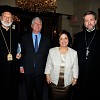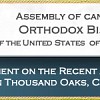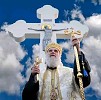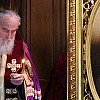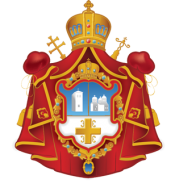САОПШТЕЊЕ
СВЕТОГ АРХИЈЕРЕЈСКОГ САБОРА
СРПСКЕ ПРАВОСЛАВНЕ ЦРКВЕ
О КОСОВУ И МЕТОХИЈИ
Сабрани на јесењем заседању Светог Архијерејског Сабора, ми Епископи Српске Православне Цркве, на челу са Његовом Светошћу Патријархом српским Господином Иринејем, у овим тешким временима са којима се суочава наша Црква и верни народ на Косову и Метохији, најпре изражавамо подршку Његовом Преосвештенству Епископу рашко-призренском Господину Теодосију, свештенству, монаштву и верном народу у Епархији рашко-призренској, и њиховим напорима да опстану и остану на Косову и Метохији као изворишту српске православне духовности и нашег идентитета.
Изражавамо и своју забринутост због најновијег развоја догађаја, посебно бројних инцидената, крађа и других притисака, усмерених против нашег народа. Међународне и локалне политичке представнике подсећамо да су дужни да обезбеде миран и достојанствен живот за све грађане и да не дозволе било какво насиље. Посебно наглашавамо важност присуства и активну улогу међународних снага, КФОР—а и мисије ОЕБС—а, у складу са Резолуцијом Савета безбедности Уједињених нација 1244, која треба да се настави све док се не створе нормални услови за живот свих заједница на Косову и Метохији.
И овом приликом понављамо чврст и јединствен став целог Архијерејског Сабора наше Цркве, изречен на овогодишњем редовном мајском заседању, да ни под коју цену не сме да се доведе под знак питања пуни суверенитет и интегритет Србије на Косову и Метохији, који је гарантован Уставом Србије и Резолуцијом 1244 СБ УН. За нашу Цркву, Косово и Метохија никада није било, нити може бити само политичко питање за чије решавање монопол имају искључиво државни органи. За нас је питање Косова и Метохије, кроз сву нашу историју и данас, пре свега питање опстанка нашег свештенства, монаштва, верног народа и, нарочито, наших древних светиња без којих не бисмо били оно што јесмо.
Као што о опстанку нашег народа, посебно оне најугроженије већине која се налази јужно од Ибра, не можемо говорити без очувања наших светиња, тако не можемо говорити ни о очувању светиња само као културно-историјских споменика, чији је опстанак наводно могућ без опстанка нашег верног народа. Наше светиње имају свој најдубљи смисао као места литургијског саборовања нашег народа, и то не само оног са Косова и Метохије већ и из свих српских крајева, али и читавог света.
Обавезе свих нас према Косову и Метохији су данас веће јер се налазимо пред све јачим међународним притисцима, једним делом да наша земља пристане да се одрекне Косова и Метохије, или кроз признавање Косова и Метохије директно или прећутном сагласношћу да Косово добије чланство у Уједињеним нацијама и другим међународним организацијама. Било какав потпис који би омогућио признање Косова, учешће у УН или одрицање Србије од њега под било којом формом, заувек би укинуо свако историјско право Србије на овим темељним просторима наше духовности и државности.
Посебно забрињава што се под видом наводног „разграничења између Срба и Албанаца” намеће могућност одвајања ако не целог, онда највећег и најважнијег дела Косова и Метохије из састава Србије и његово признање као дела било независног Косова или чак такозване Велике Албаније. Последице овакве одлуке би биле трагичне за опстанак нашег народа и наших светиња. У том случају би већина Срба, без адекватне заштите и безбедности, била принуђена на исељавање са својих историјских простора, где би се са још већим интензитетом формирало једно етнички чисто албанско друштво, уз брисање свих трагова нашег историјског постојања. Идеја такозване поделе и раздвајања органског јединства између Срба јужно и северно од реке Ибра, и од осталих Срба без обзира где живе, уноси велики немир и забринутост међу наше вернике и не ужива подршку највећег броја грађана Србије и Срба уопште. Територијална подела је посебно опасна јер би неибежно подразумевала стварање етнички чистих простора, што би имало и несагледиве последице за цео регион који се још болно опоравља од страдања и разарања у току деведесетих година прошлог века. Зато је наша Црква увек подржавала изградњу друштва у коме људи различитог порекла могу да живе у миру, уз пуну заштиту и поштовање свог верског, културног и народног идентитета.
Свети Архијерејски Сабор је посебно забринут због тога што наша Црква од 2007. године никада није била званично позвана да изнесе своје сугестије поводом заштите наших светиња, свештенства, монаштва и верног народа. Већ годинама инсистирамо на адекватној заштити наших светиња, јер смо свакодневно сведоци не само отвореног неиспуњавања постојећих регулатива (везаних за елементе такозваног Ахтисаријевог плана који су ушли у такозвано косовско законодавство), чак и поред међународних притисака, већ видимо да локалне самопроглашене косовске институције несметано настављају са процесом који води ка стварању етнички чистог албанског Косова, у коме дугорочно не би било места за Србе, али и за остале неалбанске заједнице. Систематско избегавање преузетих обавеза Приштине везаних за Заједницу српских општина и других обавеза из „Бриселског дијалога” само потврђују да би у постојећим условима и са садашњим односом према Србима било веома тешко наћи дугорочно решење. То свакако не значи да наша Црква подржава „замрзнути конфликт“ већ, штавише, подстичемо наставак једног отвореног, али пажљиво вођеног дијалога који би у први план ставио заштиту људских и верских права, унапређење владавине права, јачање правне сигурности и ефикаснију заштиту угрожене духовне и културне баштине, која не би зависила од самовоље локалних косовских институција, већ би била регулисана на свеобухватнији начин уз међународни надзор и јасно дефинисане механизме примене договорених принципа заштите. Такође је тешко говорити о било каквом даљем дијалогу без стварања услова за повратак прогнаних Срба и заштити и враћању њихове узурпиране имовине. Одустајање од овог захтева значило би прихватање послератног етничког чишћења као свршеног чина. Без ових предуслова је немогуће говорити о трајнијем решењу проблема на Косову и Метохији. Зато је постављање исхитрених рокова, и поред крајње неповољних услова на терену и врло комплексне ситуације у Европској унији, без икаквог оправдања.
Апелујемо на државне представнике Републике Србије да, уместо на тражењу што бржег споразума са Приштином, више пажње посвете изградњи једне државне и националне платформе у чијој би припреми учествовали релевантни чиниоци нашег друштва. На тај начин би се чували основни интереси нашег народа и повратило би се поверење свих кључних друштвених фактора у земљи, Истовремено треба наставити на изградњи поверења и разумевања и са косовским Албанцима и осталим људима добре воле који живе на Косову и Метохији и другим деловима Србије, јер будућност целог региона пре свега зависи од спремности и способности свих нас да живимо једни са другима у миру и међусобном поштовању.
Са приближавањем јубилеја 800. годишњице самосталности наше Свете Цркве, веома је важно да се сви подсетимо да је државност Србије од почетка била нераскидиво повезана са духовном традицијом наше Цркве као кључног фактора нашег идентитета кроз историју.
COMMUNIQUE OF THE HOLY ASSEMBLY OF BISHOPS OF THE SERBIAN
ORTHODOX CHURCH ON KOSOVO AND METOHIJA
Gathered at the autumn meeting of the Holy Assembly of Bishops, we the Bishops of the Serbian Orthodox Church headed by His Holiness Serbian Patriarch Irinej, in these difficult times which our Church and the faithful are facing in Kosovo and Metohija, first of all express our support to His Grace Bishop Teodosije of Raška-Prizren, his clergy, monastics and the faithful people of the Diocese of Raška-Prizren in their efforts to persist and remain in Kosovo and Metohija, the heartland of the Serbian Orthodox spirituality and our identity.
Furthermore, we express our concern due to the latest developments, especially many incidents, thefts and other forms of pressure targeted against our people. We remind the international and local political representatives that they are obliged to provide peaceful and dignified life for all citizens and not to allow any violence. We there especially emphasize the importance of the presence and active role of the international peace-forces KFOR and the OSCE mission in accordance with the UNSC Resolution 1244, which must continue until normal living conditions have been established for all communities in Kosovo and Metohija.
On this occasion too, we repeat the firm and unanimous position of all the members of the Assembly of Bishops of our Church expressed at the annual meeting in May, that the full sovereignty and integrity of Serbia in Kosovo and Metohija cannot be questioned under no circumstances, as it is guaranteed by the Constitution of Serbia and the UNSCR 1244. For our Church, Kosovo and Metohija has never been nor can ever be only a political issue whose solving is under exclusive monopoly of the state authorities. For us, throughout our history and today, Kosovo and Metohija has primarily been a question of the survival of our clergy, monastics and the faithful people and, especially, our ancient holy sites without which we would never become what we are today.
As we cannot discuss the survival of our people, especially of the vulnerable majority of the Serbs living south of the Ibar river, without the preservation of our holy sites, we equally cannot discuss the preservation of our holy sites as cultural and religious monuments only, whose survival is allegedly possible without our congregation. Our holy sites have their deepest meaning solely as places of liturgical gathering of our people, not only of those from Kosovo and Metohija, but from all Serb-inhabited regions and the world.
Our obligations towards Kosovo and Metohija are more profound today, as we have been facing increasingly strong international pressures on our country to agree to renounce Kosovo and Metohija, either by a direct act of recognition of Kosovo or by a tacit approval of Kosovo’s membership in the UN and other international organizations. Any signature which would ultimately enable recognition of Kosovo, participation in the UN or Serbia’s renouncement of it in any form, would forever deprive Serbia of her historical rights to the area so fundamentally important for our spirituality and statehood.
We are particularly concerned that under the disguise of the alleged “delimitation between Serbs and Albanians” the possibility of separation from Serbia is intruded – if not of all Kosovo and Metohija, then of its greatest and most important part, which would lead to its recognition as a part of either independent Kosovo or even of the so-called Greater Albania. Consequences of such a decision would be tragic for the future of our people and our holy sites. In such a scenario the majority of Serbs, deprived of adequate protection and security, would be forced to flee their historical homeland, where an ethnic clean Albanian society would be established with even greater intensity, and with obliteration of all traces of our historical existence. The idea of the so-called partition or separation of the organic unity between the Serbs south and north of the Ibar river, and of them jointly from the other Serbs, no matter where they live, creates lots of uneasiness and grave concern amongst our people and does not enjoy support of the majority of Serbia’s citizens and Serbs all over the world. Territorial partition is especially dangerous because it would inevitably mean the creation of ethnic clean territories, which would have unforeseeable consequences for the region, still painfully recovering from the suffering and destruction inflicted during the 1990s. For this reason our Church has always supported building of a society in which peoples of different origin can live in peace, with full protection and respect of their religious, cultural and ethnic identities.
The Holy Assembly of Bishops is particularly concerned that as of 2007 our Church has never been officially invited to express her suggestions on the protection of our holy sites, clergy, monastics and the faithful. For years we have been insisting on adequate protection of our holy sites because we have witnessed not only everyday blatant lack of implementation of the existing legal provisions (related to the elements of the “Ahtisaari plan” which were incorporated in the so-called Kosovo legislation) even in spite of international pressures, but we have also seen that local self-proclaimed Kosovo institutions continue with impunity the process which is aimed at creation of ethnic clean Albanian Kosovo in which in the long run there would be no place for Serbs and other non-Albanian communities. Systematic avoidance of the accepted obligations of Priština related to the Community of Serbian Municipalities and other obligations from the “Brussels dialog” only confirms that in the current circumstances and with the existing behaviour towards the Serbs it would be very hard to find a long-term solution. This by no means implies that our Church supports “a frozen conflict”, on the contrary – we encourage the continuation of an open but carefully guided dialog which would primarily focus on the protection of human and religious rights, improvement of the rule of law, strengthening of the legal security and more efficient protection of the vulnerable spiritual and cultural heritage which would not depend on the self-will of the local Kosovo institutions, but would be regulated in a more comprehensive way with an international supervision and clearly defined mechanisms of implementation of the agreed principles of protection. It is also very hard to talk about any further dialogue without creating conditions for the return of the expelled Serbs, the protection and restitution of their usurped property. Abandoning this request would mean an approval of the post-war ethnic cleaning as a done deal. Without these preconditions, it is impossible to talk about a durable solution of problems in Kosovo and Metohija. For this reason, imposing of hasty deadlines despite extremely unfavourable conditions on the ground and a very complex situation in the European Union is without any justification.
We appeal on the state representatives of the Republic of Serbia that instead of seeking hasty settlement of issues with Priština, pay more attention to the building of a state and national platform in the preparation of which all relevant factors of our society would participate. Only this way would the basic interests of our people be preserved and the confidence of all crucial social counterparts in the land would be reestablished. At the same time, we need to continue building confidence and understanding with Kosovo Albanians and all other peoples of good will who live in Kosovo and Metohija, as well as in other parts of Serbia, because the future of the region primarily depends on the readiness and ability of all of us to live with one another in peace and mutual respect.
With the approaching of the 800 years’ Jubilee of the Autocephaly of our Holy Church it is of paramount importance that we all remind ourselves that the statehood of Serbia has been from its very establishment inseparably intertwined with the spiritual tradition of our Church as the crucial factor of our identity throughout the history.
|
| |||||||||||||
